In a significant judgment, the Karnataka High Court has ruled that an accused person cannot submit evidence through an affidavit in cases under the Negotiable Instruments Act. The court set aside an order of a lower court that had allowed an accused to file an affidavit in lieu of examination-in-chief. Background: The case arose from
To Read More Please Subscribe to VIP Membership for Unlimited Access to All the Articles, Download Available Copies of Judgments/Order, Acess to Central/State Bare Acts, Advertisement Free Content, Access to More than 4000 Legal Drafts( Readymade Editable Formats of Suits, Petitions, Writs, Legal Notices, Divorce Petitions, 138 Notices, Bail Applications etc.) in Hindi and English.




